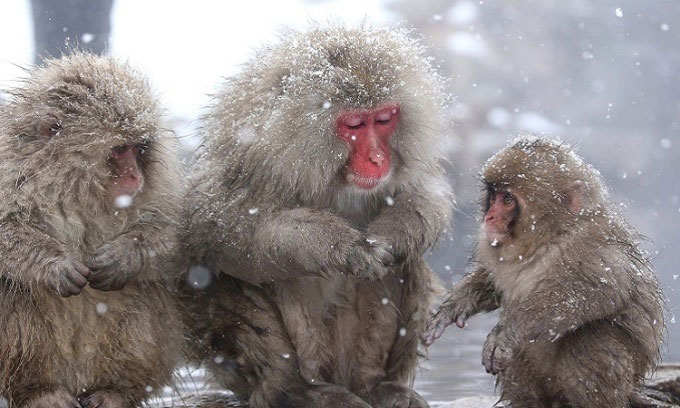Snow monkeys survive in one of the coldest regions of the world by catching fish such as brown trout in rivers and streams.
Snow monkeys (Macaca fuscata) are native to the main islands of Japan, except Hokkaido. This northernmost non-human primate species faces food scarcity due to snow cover in the Kamikochi area of Chubu Sangaku National Park. With their usual food becoming hard to find, snow monkeys have less energy and face the risk of starvation. However, the streams connected to groundwater flow throughout the winter, maintaining water temperatures around 5 degrees Celsius, making them easily accessible for searching for alternative fresh food sources.
An international research team led by experts from the University of Birmingham published their findings in the journal Scientific Reports on November 29 about how snow monkeys hunt freshwater animals in streams, including brown trout, to survive the winter. Previously, researchers noted that snow monkeys would catch sea fish when the opportunity arose, including dried fish or those stranded on beaches.

Snow monkeys bathing in hot springs during winter. (Photo: Japan Forward)
The researchers found brown trout in the fecal samples of snow monkeys and concluded that they catch this fish in shallow waters along streams. By using DNA barcoding in the fecal samples to determine the winter diet of the monkeys, the team discovered that they also consume insects along the riverbanks and mollusks. They found evidence of freshwater insects in the snow monkey feces, including eggs and larvae of aquatic insects. This supplementary food source likely helps them survive.
“Snow monkeys have a wider range of habitats in winter when food becomes scarce, but Kamikochi is located in a deep valley, making it difficult for them to cross the mountain range. With a high population density, snow monkeys must endure winter in an extremely harsh environment. This creates survival pressure. With an abundance of freshwater organisms in the streams, the Kamikochi area may be the only environment in Japan with the favorable topographical, geographical, and meteorological conditions for snow monkeys to supplement their winter diet,” said Alexander Milner, a professor of river ecosystem systems at the University of Birmingham.

















































